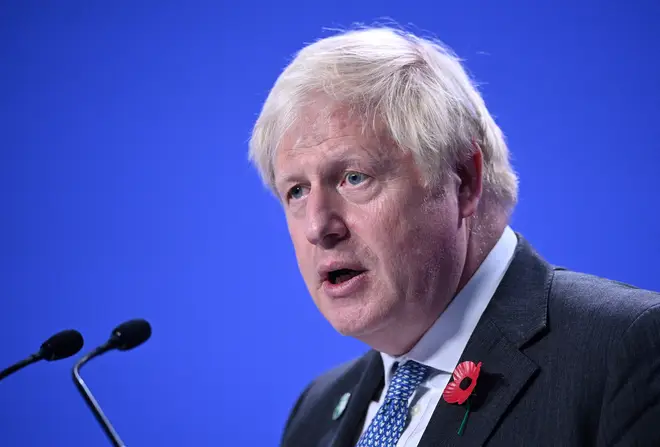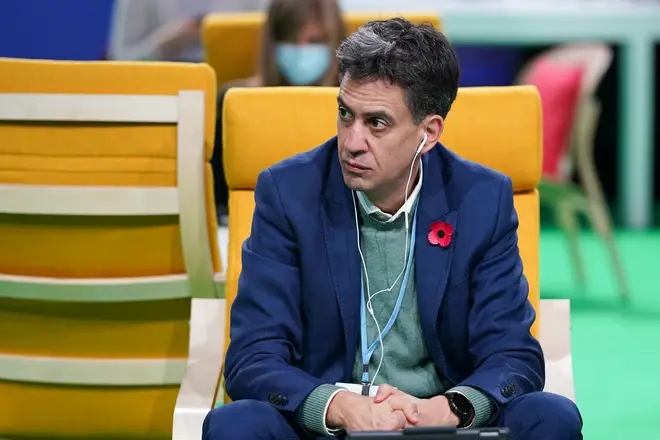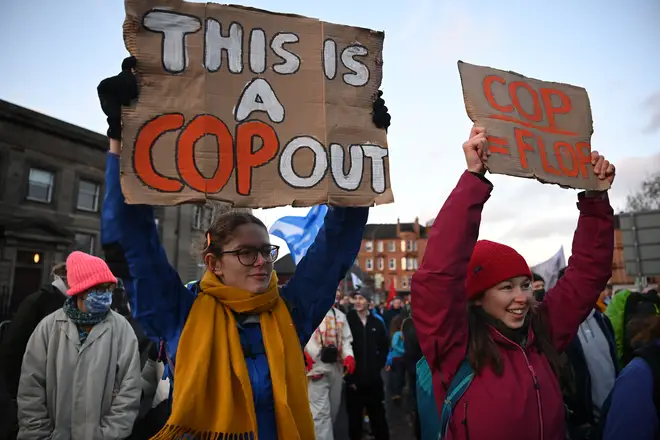
Clive Bull 1am - 4am
6 November 2021, 22:30

Boris Johnson has called for countries to show more ambition in the second and final week of the crucial COP26 climate change conference.
The prime minister urged ministers and negotiators at the Glasgow summit to "pull together and drive for the line" to secure ambitious action on climate change and ultimately limit global warming to 1.5C.
Mr Johnson said: "We have seen nations bring ambition and action to help limit rising temperatures, with new pledges to cut carbon and methane emissions, end deforestation, phase out coal and provide more finance to countries most vulnerable to climate change.
"But we cannot underestimate the task at hand to keep 1.5C alive.

Andrew Castle hears from Oxford University Professor about COP26
"Countries must come back to the table this week ready to make the bold compromises and ambitious commitments needed."
But Labour's shadow business secretary Ed Miliband warned the world is a "long way off" where it needs to be to keep 1.5C in reach, and urged Mr Johnson to engage directly with the talks and personally drive the negotiations forward.
He said the PM was offering "empty exhortation and commentary".
"We have a right to expect him to engage directly in these final days, personally driving these negotiations forward, pushing all the major emitters to do more."

The first week of the talks saw much of the attention focus on the attendance of world leaders and announcements of countries signing up to pledges to end deforestation, end fossil fuel funding abroad, phase out coal and cut the powerful greenhouse gas methane.
Environment, climate, energy and other ministers are arriving this week to get down to political negotiations in the business end of the conference.
These include parts of the Paris Agreement – the world's first comprehensive deal to tackle climate change agreed in the French capital in 2015 – that still need finalising, as well as on markets for trading carbon emissions, transparency over what countries are doing, and common timeframes for action.
Negotiations also continue on finance for poor countries to adapt to a changing climate and develop cleanly, and on addressing the loss and damage to people, land, livelihoods and infrastructure that will inevitably occur as a result of rising temperatures.
Read more: Idris Elba: 'people might be irritated' at celebs discussing climate change
And negotiators are trying to hammer out a "cover decision" from Glasgow that will set out how countries will close the gap between the action to cut emissions they have pledged to take under the Paris Agreement and what is needed to avoid dangerous temperature rises of more than 1.5C.
Scores of countries, as well as UN secretary-general Antonio Guterres, are pushing for accelerated action on emissions cuts this decade to keep the 1.5C goal alive.
There is a concerted drive for nations to revisit and boost their carbon-cutting efforts every year, though that is facing push back from others, who want to keep.
As the talks enter their second week, the UN and UK organisers face ongoing criticism about the logistics, accessibility and inclusivity of the conference, which tens of thousands of people have registered to attend.

Delegates have faced daily lateral flow tests, but some have been forced to self-isolate after catching Covid-19, while there have been long queues and crowds to get into the venue, and social distancing requirements have reduced access to rooms where negotiations and other events have taken place.
On Friday and Saturday, meanwhile, tens of thousands of protesters took to the streets demanding climate action and a fair transition to a greener world, with campaigners taking up Greta Thunberg's warning that the COP26 summit is just "blah blah blah".
On Saturday, huge crowds took part in marches and rallies in Glasgow, London and hundreds of places across the UK and around the world, calling for greater climate action. It came after youth activists marched through the Scottish city where the talks are being held on Friday.
Alongside the negotiations, this week will see a focus on issues such as support for developing countries to adapt to climate change, cleaning up transport and tackling climate change in cities, regions and states.